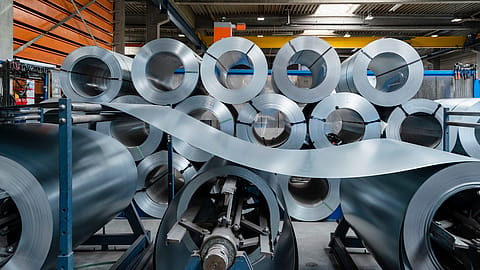Steel industry's operating profits to contract 45-50% in FY23: ICRA
Indian steel companies face a bumpy road ahead as the external environment becomes more challenging due to elevated inflation, energy prices and rising interest rates.

Domestic steel industry's full-year operating profits are expected to contract by 45-50% year-on-year (YoY) in FY23, leading to the free cash flows slipping into negative territory after two years, according to ratings agency ICRA.
Indian steel companies face a bumpy road ahead as the external environment becomes more challenging due to elevated inflation, energy prices and rising interest rates.
In the second quarter of FY23, the industry's absolute earnings plummeted to a nine-quarter low due to combination factors which included falling realisations and elevated coal and energy costs, the ratings agency says.
While earnings are directionally expected to rise from Q3 FY23 as input cost pressures alleviate somewhat, they would still remain significantly lower than the levels seen in FY22, ICRA adds.
"Dependence on external financing to meet committed expansion plans is likely to increase going forward, early signs of which can be observed in the gradual increase in the steel industry's borrowing levels during the first half of FY2023," says Jayanta Roy, senior vice-president & group head, Corporate Sector Ratings, ICRA.
Consequently, the industry's leverage – total debt to operating profits – deteriorated to an estimated 2.7 times in H1 FY23 as against 1.1 times in FY22.
"However, given the expectation of a recovery in earnings in H2 as cost pressures subside, the industry's leverage levels are expected to remain in the range of 2.0 - 2.5 times in both FY23 and FY24. We believe that this would still make steel companies resilient to withstand any worsening of the macroeconomic environment next fiscal," Roy adds.
Recommended Stories
As per the World Steel Association's (WSA) latest forecast, global steel demand is expected to contract for the first time in seven years by 2.3% year-on-year (YoY) in calendar year 2022, and the pace of growth is slated to remain at an anaemic 1% in 2023. This, however, does not take into account any further large Covid-19 outbreaks in the near term, even though a sharp rise in new infections have been witnessed in recent weeks.
In a boost for the domestic steel industry, the central government in November scrapped the 15% export duty on steel products.
While India's finished steel exports are expected to gradually increase from the November-22 lows following the withdrawal of export duty, it is unlikely to go back to levels seen in FY21 and FY22 even in FY24, says ICRA.
On the other hand, given the limited growth opportunities in key global steel producing hubs of China, Japan, South Korea, CIS, Europe, and the US, finished steel exports to India have been steadily increasing, resulting in India becoming a net finished steel importer in two back-to-back months during October-November 2022, it says.
(INR CR)
ICRA highlights that global steel trade flows, especially from countries like Japan, South Korea, Russia, and China, can be redirected in greater volumes to growing markets like India, keeping imports at an elevated level in FY24 as well.
On the demand-supply scenario, supported by the government’s infrastructure led growth model, domestic finished steel demand registered a double-digit growth of 11.9% in the first eight months of the current fiscal and looks poised to close the year with a growth of around 8%.
However, given the expectation of a slowdown in the pace of economic activity over the next few quarters, domestic steel demand growth is likely to moderate to 6-7% in FY24, cautions ICRA.
"Fresh steel capacities accumulating to 21-22 million tonne per annum are lined up for commissioning in FY2023/ FY2024. Given the prospect of a moderation in domestic steel demand growth and a lacklustre export environment, fresh supplies are likely to outrun incremental demand, which we believe will pull down the industry's capacity utilisation levels to 78% in FY2024 from 80% in FY2022. As the industry's earnings become less attractive and leverage levels start to inch up, large aspirational capex programs that have not received financial commitment as yet could get deferred," says Roy.